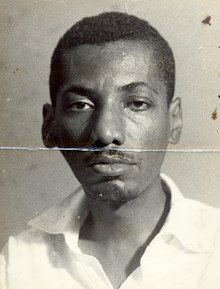Solano Trindade
Solano Trindade | |
|---|---|
 | |
| Born | July 24, 1908 Recife, Pernambuco, Brazil |
| Died | February 19, 1974 (aged 65) Rio de Janeiro |
| Occupation | poet, actor, playwright, activist, painter |
Solano Trindade (July 24, 1908— February 19, 1974) was a Brazilian poet, actor, folklorist, painter, stage director and activist.[1][2] Trindade was active in the Brazilian Black Movement, having founded or co-founded several popular theater and art initiatives, such as the Teatro Popular Brasileiro (Brazilian Popular Theater) company.[3][4]
His poems celebrated his Afro-Brazilian heritage, as well as denounced the racism, poverty and social inequality.[5]
Biography[]
Trindade was born in Recife; his father, Manuel Abílio Trindade, was a shoemaker and participated in the bumba-meu-boi and folk dances, his mother, Emerenciana Maria de Jesus Trindade was a street food seller and factory worker.[6]
In 1934 he participated in the first Afro-Brazilian Congress, held in Recife, and two years later, of the second one, held in Salvador, Bahia.
After a brief stay in Belo Horizonte and Pelotas, Trindade moved to Rio de Janeiro in the 1940s. There he met other artists and intellectuals, reuniting at the Café Vermelhinho. He joined the Brazilian Communist Party. In 1944 he published the book Poemas para uma vida mais simples (Poems for a simpler life). In 1945 he organized, with Abdias do Nascimento, the Comitê Democrático Afro-brasileiro (Afro-Brazilian Democratic Committee), associated with Nascimento's Teatro Experimental do Negro.
In 1950, together with his wife Margarida Trindade and sociologist , he founded the Teatro Popular Brasileiro (TPB), a popular theater group inspired by Brazilian Black and indigenous cultural traditions.[6] Trindade later moved to São Paulo, establishing a second branch to TPB and in 1961, he moved to the city of Embu, in Greater São Paulo, organizing several popular art ensembles.
Trindade acted in several films, such as A Hora e Vez de Augusto Matraga by Roberto Santos.
Trindade died in Rio de Janeiro, in 1974.[6]
Books[]
- Poemas de Uma Vida Simples, Rio de Janeiro, 1944,
- Cantares ao Meu Povo, São Paulo, 1963.
- Poemas antológicos
References[]
- ^ Castellar, Maria Rita. "Um artista do povo" (in Portuguese). Cite journal requires
|journal=(help) - ^ "O poeta Solano Trindade". GGN - O jornal de todos os brasis (in Portuguese). Retrieved 2017-06-23.
- ^ "solano trindade". www.quilombhoje.com.br. Archived from the original on 2017-10-11. Retrieved 2017-06-23.
- ^ Vermelho, Portal. "Solano Trindade – tem gente com fome! - Portal Vermelho" (in Portuguese). Cite journal requires
|journal=(help) - ^ Afolabi, Niyi (2009). Afro-Brazilians: Cultural Production in a Racial Democracy. University Rochester Press. ISBN 978-1-58046-262-4.
- ^ Jump up to: a b c http://www.ef5.com.br, F5-Web Design e Tecnologia Atualizada-. "Solano Trindade". www.museuafrobrasil.org.br. Retrieved 2021-05-15.
- Recipients of the Order of Cultural Merit (Brazil)
- Brazilian communists
- Brazilian Presbyterians
- 1974 deaths
- 1908 births
- Brazilian poets
- Afro-Brazilian people
- People from Recife